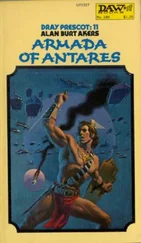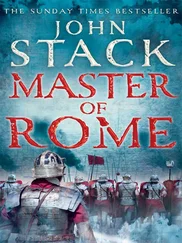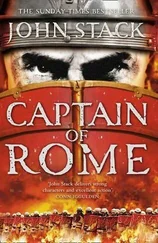The two military captains, each commanding a 100-strong company of soldiers, were new to the Santa Clara . Francisco Alvarado, the older of the two, was a veteran of the Dutch revolt and the brief war against Portugal. He was lean and wiry, a career soldier who spoke openly of his ambition to lead a command under Parma in the invasion of England. He was brash and flamboyant, but was known to be steadfast in battle.
Hernán de Córdoba, the second military captain, was a heavyset man with a shaven pate. He was deeply religious and had sworn a vow of temperance while in the service of God and his King. For the past three years he had led a company of soldiers on a galley in the waters surrounding Italy, fighting an almost continuous battle against the scourge of Muslim raiders on the trade routes of the Empire. He was obdurate and was an ardent believer in the strict military discipline that was the backbone of every Spanish company.
Two thirds of the soldiers on board the Santa Clara were raw recruits, levied from Spain and Portugal. The remainder were veterans and hailed from every corner of the Empire. They were richly attired, with no two men dressed alike. Their jerkins and breeches were of every hue, bright garish colours with elaborate braiding and embroidery, while almost every hat was festooned with plumes of feathers.
Evardo had impressed upon each of his captains the need for a shared sense of purpose, particularly between sailors and soldiers. Given their calibre he was also concerned about what his men might have heard of his defeat at Cadiz, and from the moment he had stepped on board five weeks before he had constantly been on guard for any remark that might be construed as disrespectful, knowing he had to stamp out any insubordination until he had a chance to prove himself.
He left the main deck and went below. The gun deck was cramped and he stepped over the long trails of the gun carriages as he made his way aft, his eyes looking left and right at each cannon. Because the gun deck was high above the water line, for stability the cannons were of medium calibres. Nevertheless the Santa Clara had a considerable arsenal under the command of the gunners’ captain, Diego Suárez. Like Mendez, Suárez had been with the Santa Clara since she had first been launched. He was a keen advocate of artillery warfare, a fledgling concept in the Spanish fleet, and since the Santa Clara had arrived in Lisbon he had successfully lobbied the fleet quartermasters for two additional media culebrinas , bringing the total numbers of guns on board to twenty-six.
The biggest of these were the two Italian and six Spanish bronze media culebrinas which fired 10 pound iron shots, and four medio cañón pedreros , firing a 7 pound stone shot that would shatter on impact, devastating a tightly packed deck. Before battle each gun would be loaded with the assistance of soldiers who would then report back to their posts in the fore and aft castles and the fighting tops. The guns would be lashed to the hull and although the Santa Clara carried a considerable store of powder and shot the guns would only be fired once for each attack, just moments before the Santa Clara would close on a ship for boarding, thereby causing the maximum of casualties and confusion amongst the enemy.
Gunnery tactics were continually evolving and Evardo, like every other comandante , was well aware of the English navy’s prowess in this area. If allowed to command the weather gauge they would sweep in, firing their heavy bow chasers, followed by their broadsides and stern guns, before retreating to windward to reload. It would be a fearsome attack, one the Santa Clara might have to endure, but in centuries of naval warfare boarding was the proven method of securing an enemy ship in battle, one that the Spanish had perfected over generations.
If the English wished to defeat the Spanish Armada they would have to close and board, thus putting themselves within reach and Evardo smiled involuntarily as he thought of that moment, that brief second after the broadside was fired into an enemy ship, when his entire crew would be poised to follow his command to board. Nearly a third of the soldiers on board were armed with muskets while the remainder carried arquebuses. From the towering castles of the Santa Clara they would bring down a rain of hellfire upon the English while others fired the two swivel-mounted falconetes and twelve wrought iron breech loading falcon pedreros . Ceramic pots filled with gunpowder, spirits and resin, would be set with lighted fuses and cast into any knots of resistance while the dreaded bombas , wooden tubes filled with gunpowder and grapeshot, would scatter the enemy and clear them from the gunwales.
Only then would Evardo give the order. The enemy ship would be secured with grappling hooks, sealing the fate of the English crew, and with a war-cry that Evardo could almost hear, the crew of the Santa Clara would storm over the gunwales, cutting down any who stood in their way, cleansing the ship of its heretic crew.
Again Evardo smiled, only now it was a cold sneer that did not reach his eyes. In his mind he was leading his men onto the Retribution and before him stood the man who had come to symbolize his fight against the English, Robert Varian. He would be the first to fall. But he would not be the last. The battle would not end until the English fleet had been swept from the Channel, until the Army of Flanders had made their crossing and the Armada was sailing up the Thames estuary. Only then would victory be assured, for God and Spain.
‘Patache approaching off the starboard beam,’ Evardo heard and he went aloft to see the approaching ship. It was small boat, lightly armed with only fifty men on board. It was one of a squadron of such craft that carried dispatches and supplies between the larger vessels. The patache came alongside and Evardo’s commander, de Valdés, came on board followed by four men, one of them a priest.
‘ Comandante Morales,’ de Valdés said, moving aside to allow the others to step forward. ‘I would like to introduce you to some guests of his majesty’s Armada who will be sailing with you on the Santa Clara .’
Evardo nodded genially and looked to the four men. He had expected this arrival for he had learned from other comandante s that such guests were sailing on nearly every ship of the fleet.
‘This is Padre Ignacio Garza,’ de Valdés began, indicating the priest. ‘He will conduct mass for the ship’s company once a week and tend to the spiritual needs of your crew.’
‘You are most welcome, Padre Garza,’ Evardo said sincerely and bowed his head to receive a simple blessing from the priest. He took strength from the Latin words of the benediction and recited in his mind the exhortation, written by a Jesuit in Lisbon, that had been circulated throughout the fleet; ‘ We are not going on a difficult enterprise, because God our Lord, whose cause and most holy faith we defend, will go ahead, and with such a Captain we have nothing to fear. ’
God supported the Armada’s mission to restore Catholic rule to England. King Philip and Medina Sidonia had declared this fact in every communiqué and Pope Sixtus V had issued a special indulgence to all who sailed in the Spanish fleet.
‘These two gentlemen,’ de Valdés continued, ‘are Irish nobles, Maurice Fitzgibbon and Diarmuid McCarthy. They were forced to flee their native land after the defeat of the Earl of Desmond’s glorious rebellion.’
Evardo nodded to both men and welcomed them to the Santa Clara . They replied in deplorable Spanish and seemed ill at ease on board ship but Evardo could see they possessed the wariness of hardened fighters. They would not be a burden in the battle ahead.
Читать дальше
Конец ознакомительного отрывка
Купить книгу











